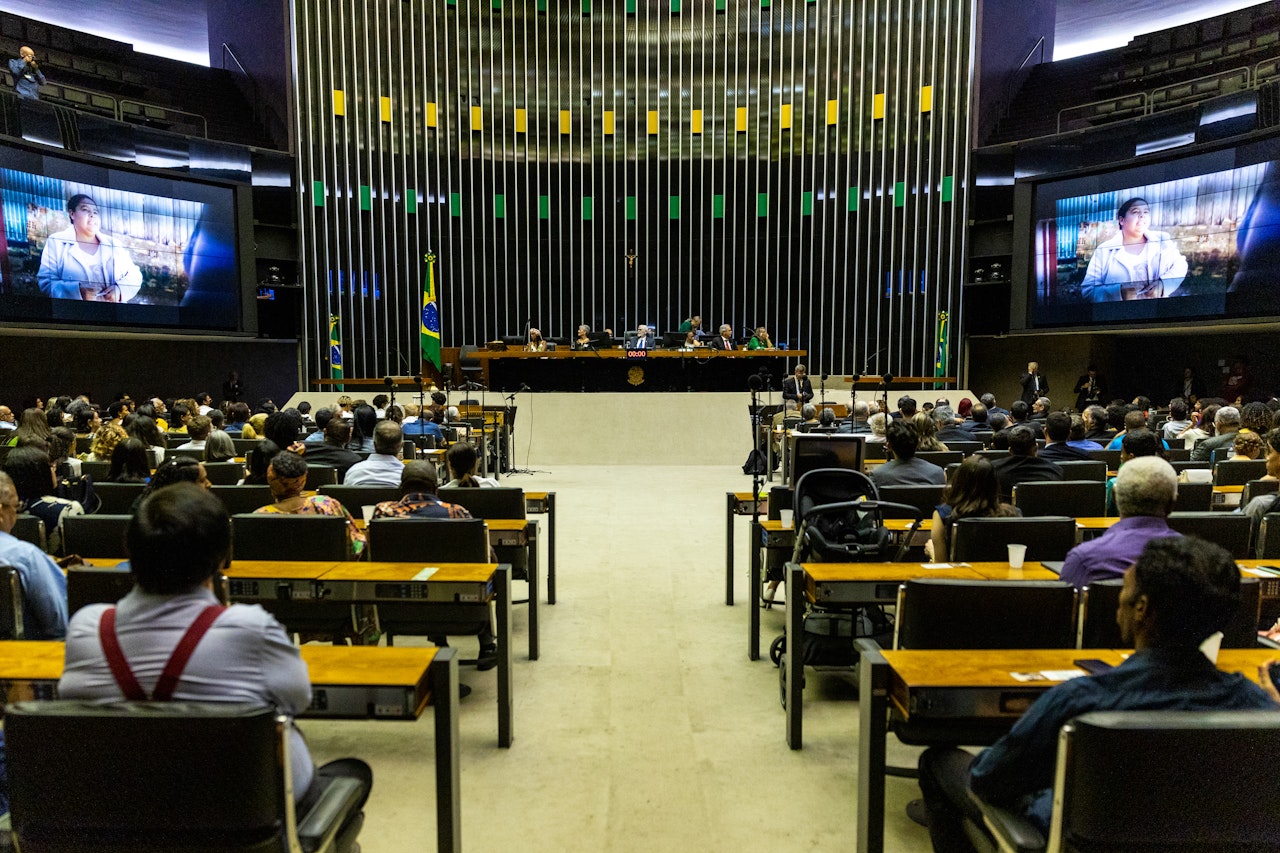Brazil
Chamber of Deputies marks 100 year journey of Bahá’í community
A solemn session in the Chamber of Deputies of Brazil explored a century of Bahá’í efforts toward social transformation in that country.

A solemn session in the Chamber of Deputies of Brazil explored a century of Bahá’í efforts toward social transformation in that country.

BRASÍLIA, Brazil — In a moment of solemn reflection, the Chamber of Deputies of the National Congress of Brazil recently marked the centenary of the Bahá’í community of that country, exploring efforts over the past century to promote a shared identity that recognizes all people as members of one human family.
“The Bahá’í community has made significant contributions to Brazilian society” stated Arthur César Pereira de Lira, the President of the Chamber of Deputies, in a statement read by Deputy Luiz Couto at the opening of the session.
“The good fruits that are being harvested today,” the statement continued, “are to a large extent a reflection of the importance attributed to the principle of justice in the Bahá’í Faith.”
Deputy Lira added that this principle finds expression in Bahá’í endeavors that “foster both the material and social prosperity of individuals and the community” by building capacity for contributing to social progress.
The long-awaited commemoration—initially scheduled for 2021 and postponed owing to the global pandemic—explored the Bahá’í community’s present and historical contributions to social progress.
A journey of faith and service
In the early 20th century, Leonora Armstrong, an American woman at the age of 25, became the first Bahá’í to settle in Brazil.
Deputy Couto spoke about Armstrong’s deep commitment to Brazilian society: “Through her profound love for the Brazilian people and her unwavering dedication to the common good, this remarkable woman triumphed over numerous challenges.”
Gabriel Marques, member of the Bahá’í National Spiritual Assembly of Brazil, in a conversation with the News Service, explained that Armstrong became renowned in that country for her contributions to endeavors of social action. These included establishing an orphanage and aiding war refugees. Her dedicated efforts during a cholera epidemic and outbreaks of typhus earned her the affectionate title of “nurse to the poor” from local media.
Reflecting on Ms. Armstrong’s life, Deputy Couto emphasized the crucial role of women in shaping a more peaceful world, stating: “Their views and energy can help us overcome our challenges.”
Contributing to a more harmonious society
Addressing the session, Liese von Czékus Cavalcanti, another member of the National Spiritual Assembly, highlighted the principle of the oneness of humanity as pivotal for fostering a harmonious society: “Our mission, as individuals, communities, and institutions, is to construct a just and prosperous society.”
Mrs. Cavalcanti spoke about the necessity of transcending indifference and disunity, stating: “We need to recognize the inherent nobility and potential in every human being. We cannot focus on what separates us. We should instead seek what unites us and work toward common goals, avoiding the pitfalls of conflict and contention.”
Echoing these thoughts, Nayrí Cruz, representing an indigenous community, highlighted the transformative effect of the Bahá’í teachings on her village, emphasizing harmony and the preservation of constructive cultural practices. “Today, we are a community united by respect, love, truthfulness, and unity,” she said.
Ms. Cruz continued, “Indigenous peoples seek to be partners in building a more just and equal society, with women playing an increasingly prominent role.”
At the heart of efforts of communities throughout Brazil to contribute to social harmony has been Bahá’í educational programs that develop people’s ability to analyze social realities, identify their communities’ needs, and direct their energies toward serving their society.
In a particularly inspiring moment, Deputy Lira shared an example of youth involved in these programs who, in collaboration with local government, removed twelve tons of trash from a river in São Sebastião.
“This effort,” noted Deputy Lira, “was a rich opportunity to foster spiritual values and a fraternal spirit, essential elements for a life based on justice and harmony.”
Faith over fear, embracing unity as the path to prosperity
Deputy Érika Kokay spoke movingly about the potential of the Bahá’í teachings to inspire greater unity within the Chamber of Deputies:
“In this Chamber, which has often experienced antagonistic moments, we can listen today to the symphony of peace presented by the Bahá’í community. The Bahá’í teachings remind us daily that humanity is one. This is a song of great courage and the counterpoint to all fears—faith in the ‘other,’ faith in the possibility that all people can live harmoniously.”
Deputy Kokay added: “May Brazil and the world find inspiration from these teachings, recognizing that humanity is one.”